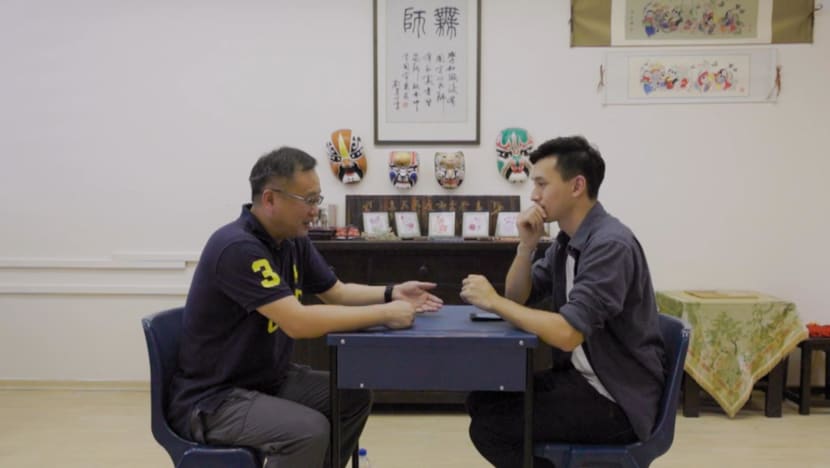Commentary: What I learnt from taking the Chinese O-Level exam at age 30
Having taken Chinese as a simplified module in secondary school and given up on his mother tongue since, documentary storyteller Ong Kah Jing (OKJ) has overcome the notion that learning languages as a working adult is too difficult.

Screengrab of documentary storyteller OKJ speaking with his former Chinese teacher, Mr Wen. (Source: YouTube/OKJ Works)

This audio is generated by an AI tool.
SINGAPORE: It is commonly believed that once we reach adulthood, the cards are stacked against us if we want to learn a new language. Even trying to improve the proficiency of our mother tongue languages seems more challenging as compared to when we were children.
Despite the commendable efforts in Singapore to actively promote mother tongue language education at an early age, this still has not stopped the worrying decline in the nation’s proficiency of Malay, Chinese and Tamil. Only four in 10 residents aged five and above speak their mother tongue most frequently at home.
I know well the challenge of being effectively bilingual. Having opted for Chinese Language B (CLB) in Secondary 3 - a simplified module offered to students who struggle at the subject - I had given up on my mother tongue for most of my adult life.
I did not regret this decision, deemed pragmatic at a time when I needed to pick up the pace in my other subjects. I also vowed that I would one day continue the journey where I left off.
That time finally came when I set my sights on sitting for the 2023 Chinese Language O-Level examinations at the age of 30. My passing grade of B4 was the result of an 18-month journey.
These pointers helped me overcome the notion that learning our mother tongue as working adults is discouragingly difficult.

ACCEPTING FEELINGS OF INADEQUACY
The most immediate discomfort to re-learning my mother tongue came from the absurdly high frequency of basic mistakes I made.
It felt as though as I lost the ability to communicate. My thoughts were sluggish and my speech slurred. Reactions to my poor choice of words or sentence construction were tempting invitations to switch back to my dominant language, English.
Feelings of inadequacy like these would paralyse even the most motivated learners. We can try to quell it by force, to study relentlessly to the point where we feel capable. But with languages being so rich and complex, it is humility rather than prowess that would sustain our learning journey.
Such wisdom was bestowed to me by one of my many mentors, who include family, friends and strangers I met online. While coming from all walks of life, a common trait among these “teachers” was their patience in allowing me to make mistakes as I tried my best to communicate with them in Mandarin.
Whenever I practised Mandarin with them, they waited for me to stutter through my attempts, correcting me only when I finished speaking. I felt like my efforts were acknowledged, which encouraged me to keep engaging in the language despite the steep learning curve.
There is sound reasoning behind this. In his commentary, Daniel Chan, Assistant Dean of NUS Centre for Language Studies, explained that the theory of aggregate marginal gains, in which making a 1 per cent daily improvement would mathematically lead to a 38-fold improvement after a year, can be applied to learning languages.
I can attest this theory holds true. Through consistent self-study, I went from not knowing the Chinese character for “chicken” to writing a 900-word composition for my O-Level exam.
My former CLB teacher, Mr Wen, said it best: “The key to sustaining your learning is that you are neither afraid of mistakes nor in a rush to see results.”
UNLOCKING THE NOVELTY OF NEW EXPERIENCES
Frankly, there is little practical reason for adults to continually use their mother tongue when English is Singapore’s de facto official language.
But learning Chinese helped me unlock new experiences previously inaccessible in English. For instance, I interviewed a temple representative about Hungry Ghost Festival rituals, and learnt the history of the iconic Creative HansVision Chinese e-dictionary from one of the company’s pioneers.
Arranging these interviews and researching the topics beforehand had to be done bilingually or in Mandarin, which motivated me to keep studying the language.
Jonas Fine Tan, the viral sensation who can speak 11 languages, has shared his experiences on TikTok on how being a polyglot unlocks new perspectives and experiences in life.
The stories from Mr Tan and many other multilinguals whom I have spoken to all echo a simple truth. There is so much more to life when we can experience it in more than one language.
FINDING THE JOY OF LEARNING
Even as I set my sights on doing my best for the O-Level exam, the true aim of my journey was to find the joy of learning, so I could maintain my Chinese proficiency in the decades to come. Nurturing the joy of learning was likewise the Ministry of Education’s key consideration in removing mid-term examinations across most levels.
The joy of learning a language doesn’t come only from hitting milestones. The popularity of K-pop and K-dramas, for instance, is enough to inspire people to learn Korean. While it’s not necessary to be fluent in Korean to ride the K-wave, it opens up more opportunities of enjoyment and fulfilment.
When we align our goals with how we derive joy from learning, our enthusiasm trumps what seems challenging, and we put in the effort because we believe it is worth it.
It is never too late to start, and once we do, we can enjoy new experiences and connections made possible because of it.
Ong Kah Jing (OKJ) is a documentary storyteller who made a YouTube documentary series about sitting for his Chinese O-Level exam at the age of 30.
Editor's note: This article has been amended to correct data on Singapore residents who speak their mother tongue at home.


















